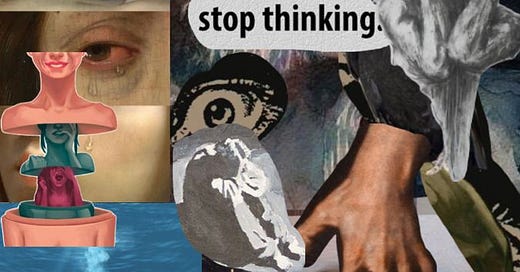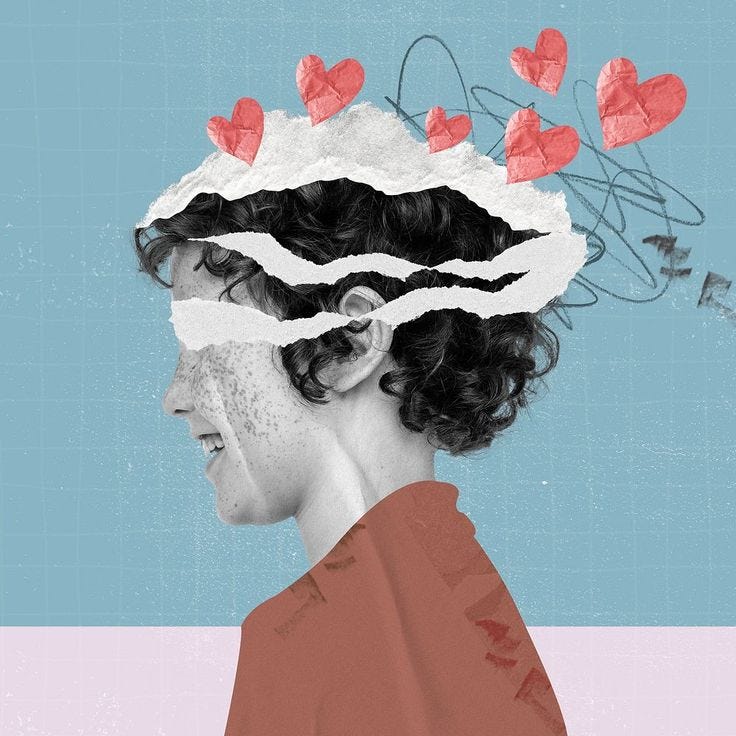are you really mentally ill?
is how we define dysfunctionality only valid in our current world
Let me start by saying this: mental illness is real. I live with it, my parents have lived with it, and my friends navigate it every day. People experience symptoms that deeply impact their ability to function in society. In fact, this inability to function day-to-day is often the benchmark therapists and psychiatrists use to measure the severity of mental illness (as outlined in the DSM-5).
But here’s the thing—I’ve never truly felt like I function in our world, and I’d bet many of you feel the same way. What gets in the way of my functioning? Systemic oppression. White supremacy. The patriarchy. Capitalism. Am I saying I don’t experience depression outside of these systems? No. But what research makes clear is that a constant barrage of information about injustice, tied with a historical context of oppression, takes a significant toll on our mental well-being.
While the impacts of social media and hyper-connectivity are well-documented, I want to zoom out. Beyond the doom-scrolling, let’s consider how we talk about mental illness, how society defines it, and how neurodiversity challenges these definitions.
How Society Shapes Our Understanding of Mental Illness
Our perception shapes our reality. None of us can fully experience someone else’s perspective; our understanding of the world is filtered through our own sensory inputs, mental frameworks, and lived experiences. This creates boundaries around what we define as "normal" or "acceptable" behavior.
In society, experiences that deviate from this norm are often labeled as mental illness. Take hallucinations in schizophrenia: they’re typically dismissed as "false" experiences, but what if they’re not? What if they’re simply another way of perceiving reality? If perception defines behavior, then calling one perception "right" and another "wrong" becomes less about truth and more about societal judgment.
In a world without the pressures of poverty, discrimination, and systemic stressors, would we even think of mental illness in the same way? Could it be possible that what we now call mental illness might simply be seen as a different way of experiencing reality—no less valid than anyone else’s perception?
The Neurodiversity Paradigm: A New Lens
The neurodiversity movement challenges the idea that mental differences are inherently pathological. Autism, ADHD, and even conditions like schizophrenia are viewed as natural variations in human functioning. From this perspective, these differences don’t need to be fixed or erased—they need to be understood and respected.
This philosophy shifts the conversation: mental "disorders" are no longer framed as broken pieces to be mended but as part of the rich spectrum of human diversity. Negative social attitudes—not the differences themselves—are often what lead to stigma, discrimination, and suffering.
Historically, people with mental health conditions have been ostracized, labeled "mad," and stripped of their humanity. The neurodiversity movement asks us to reconsider these labels, much like society has reexamined constructs around gender, ethnicity, and culture.
Are All Perceptions Valid?
This raises a provocative question: Is anyone’s reality more "right" than anyone else’s? According to the neurodiversity framework, the answer is no. Every individual’s reality is shaped by their biology, psychology, and life experiences. Declaring one perception more valid than another often stems from cultural norms, not objective truth.
Of course, this doesn’t mean we abandon treatment or support. People still face real challenges—like depression, anxiety, or psychosis—that can disrupt their lives. But what if instead of viewing these experiences as inherently “wrong,” we focused on building a society that accommodates different ways of being?
Imagine a world where all perceptions are equally accepted. What we now call mental illness might be celebrated as a unique perspective rather than a deficit. Without judgment or stigma, the term "mental illness" itself might fade away, replaced by a language that centers individuality and diversity.
Where Do We Go From Here?
Can we create such a society? Maybe not entirely. Humans are bound by biology, culture, and social dynamics that often favor conformity. But the neurodiversity movement offers a starting point. It challenges us to rethink what we call "normal" and who gets to define it.
Our definitions of mental health are deeply influenced by societal values. If those values shift, so too will our understanding of what it means to be mentally well. Maybe the problem isn’t with individuals who struggle to fit into society’s narrow expectations but with the expectations themselves.
It’s worth imagining a world where all ways of experiencing life are valid, where our differences aren’t just tolerated but celebrated. Because in the end, no one’s reality is more “right” than anyone else’s—it’s just another way of being.
References:
Radden, Jennifer and Jonathan Y. Tsou, "Mental Disorder (Illness)", The Stanford Encyclopedia of Philosophy (Fall 2024 Edition), Edward N. Zalta & Uri Nodelman (eds.), URL = <https://plato.stanford.edu/archives/fall2024/entries/mental-disorder/>.





